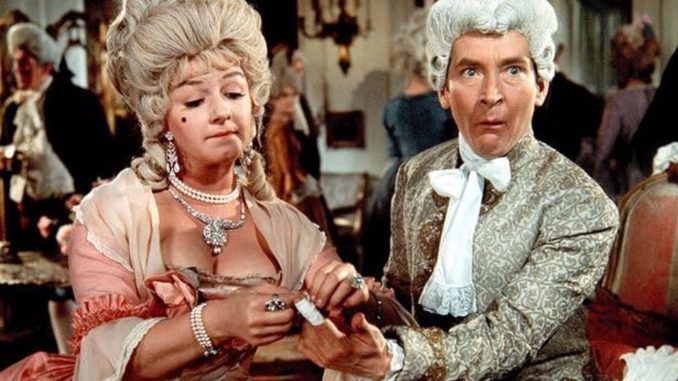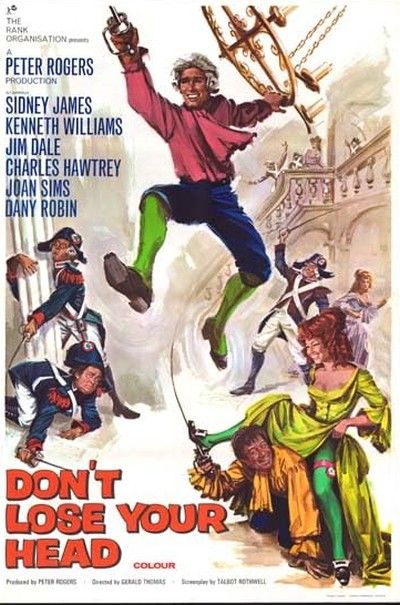
Rating: B
Dir: Gerald Thomas
Star: Sidney James, Kenneth Williams, Jim Dale, Joan Sims
The franchise lost its distribution, after a change at the top of Anglo-Amalgamated, moving over to Rank. However, this was not originally released with the “Carry On” part of the title, because Rank wanted to make a break with the product of its rival. But after poor initial box-office results, they re-instated it, and results improved subsequently. It’s certainly a strong entry, with some of the best production values in the series. Various stately homes were used for both exteriors and interiors, such as Clandon House and Waddesdon Manor, and set pieces like the Parisian square used a large number of extras. There’s a lot of costumes, wigs and period detail too, all adding to the atmosphere.
It’s a loose spoof of The Scarlet Pimpernel, with bored aristocrat Sir Rodney Ffing (James) moonlighting as “The Black Fingernail”, rescuing his colleagues from Madame Guillotine during the French Revolution. He’s ably assisted by sidekick Lord Darcy Pue (Dale), and hunted, with increasing desperation, by the evil Citizen Camembert (Williams), head of the revolutionary police. Camembert ends up travelling to England in pursuit of his prey, with sister Désirée Dubarry (Sims), and they do succeed in identifying Sir Rodney as the man of many disguises behind the fingernail. However, the Englishman is no easier to catch on his home turf, eluding the Frenchman and heading back to Paris to rescue his true love, Jacqueline (Dany Robin, who’d end up marrying James’s agent) from Camembert’s clutches.
 Most of the cast are near-perfectly cast in their roles. Though it’s surprising how well James can pull off an effeminate fop, in addition to his more earthy secret identity, whose talent for impersonation causes no end of mischief. But it’s likely Talbot Rothwell’s script which is the real start, serving up any number of lines with the cast deliver with the degree of relish necessary, e.g. “By this time tomorrow, the Duc de Pommfrit will have had his chips,” with or without an extra helping of double entendre: “But then, you’ve always had magnificent balls.” The duel between Sir Rodney and Camembert, fabricated by the latter over the dubious “honour” of Désirée, could have strayed in from a Marx brothers movie, such is its degree of physical absurdity.
Most of the cast are near-perfectly cast in their roles. Though it’s surprising how well James can pull off an effeminate fop, in addition to his more earthy secret identity, whose talent for impersonation causes no end of mischief. But it’s likely Talbot Rothwell’s script which is the real start, serving up any number of lines with the cast deliver with the degree of relish necessary, e.g. “By this time tomorrow, the Duc de Pommfrit will have had his chips,” with or without an extra helping of double entendre: “But then, you’ve always had magnificent balls.” The duel between Sir Rodney and Camembert, fabricated by the latter over the dubious “honour” of Désirée, could have strayed in from a Marx brothers movie, such is its degree of physical absurdity.
Indeed, the moment where I laughed loudest was simply Peter Butterworth as Camembert’s lackey, feeling for a missing horse with his hands, as if it had simply gone invisible. Then there is a genuinely good action set-piece at the end, with Sir Rodney, Lord Darcy and the Duc (Charles Hawtrey) fighting their way through Camembert’s mansion towards Jacqueline. It’s remarkably well-staged: Dale is most impressive, but James, then in his mid-fifties, holds his own, and Hawtrey engaging in energetic sword-play is not something I expected to see. Meanwhile, Camembert is bemoaning the property destruction resulting from the brawl: “Oh, beautiful things! Irreplaceable.” It all adds up to one of the campest of entries, with even James becoming a pantomime dame at one point. Yet it’s an approach which entirely fits the atmosphere.
